人教版(2019)选择性必修第一册Unit 4 Body Language Revision 课件(45张)
文档属性
| 名称 | 人教版(2019)选择性必修第一册Unit 4 Body Language Revision 课件(45张) |  | |
| 格式 | zip | ||
| 文件大小 | 304.4KB | ||
| 资源类型 | 教案 | ||
| 版本资源 | 人教版(2019) | ||
| 科目 | 英语 | ||
| 更新时间 | 2021-10-22 20:30:39 | ||
图片预览

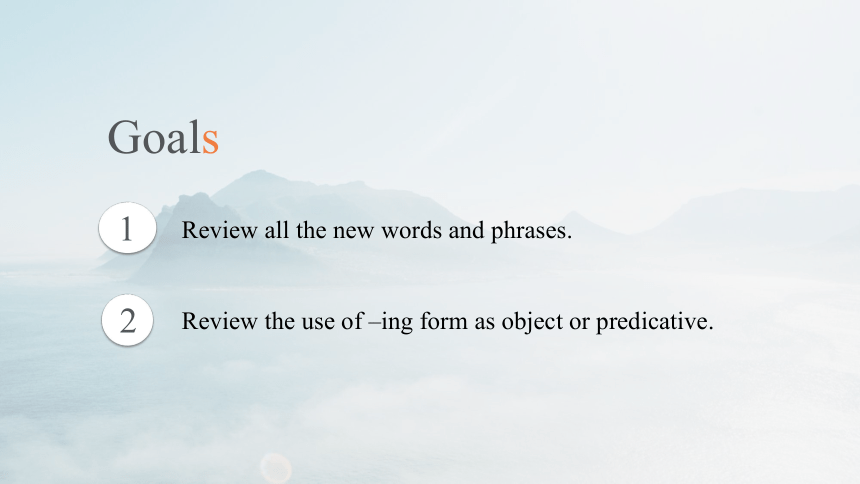
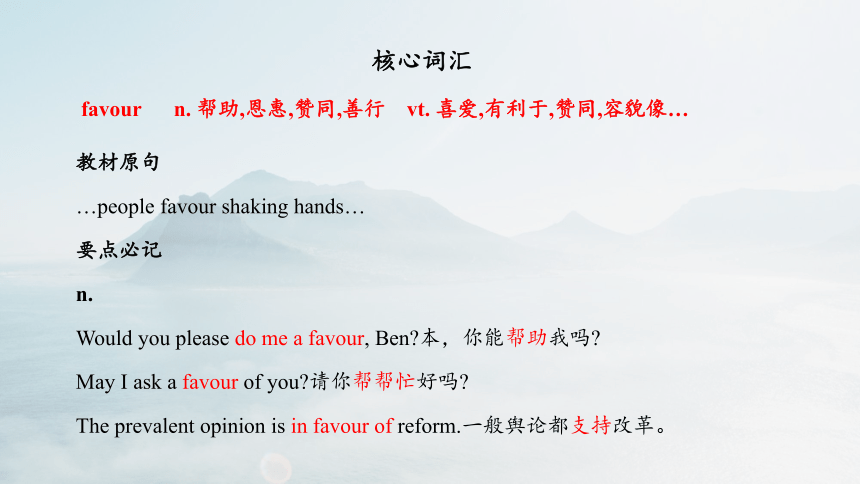
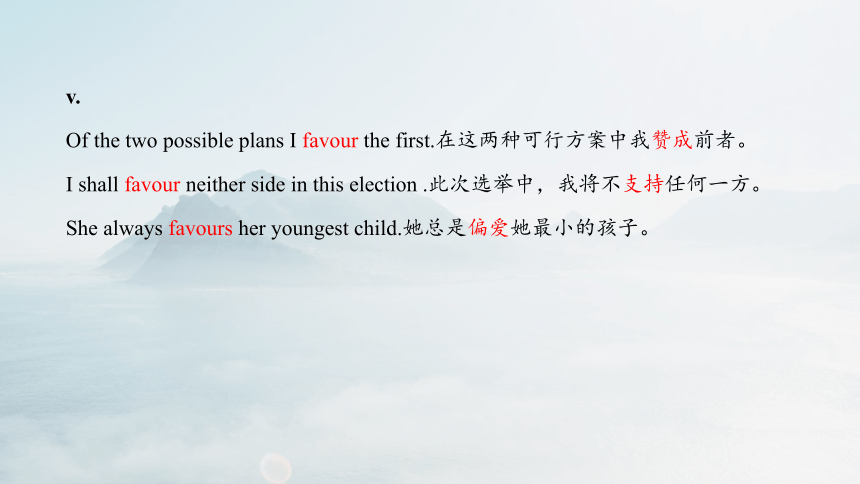
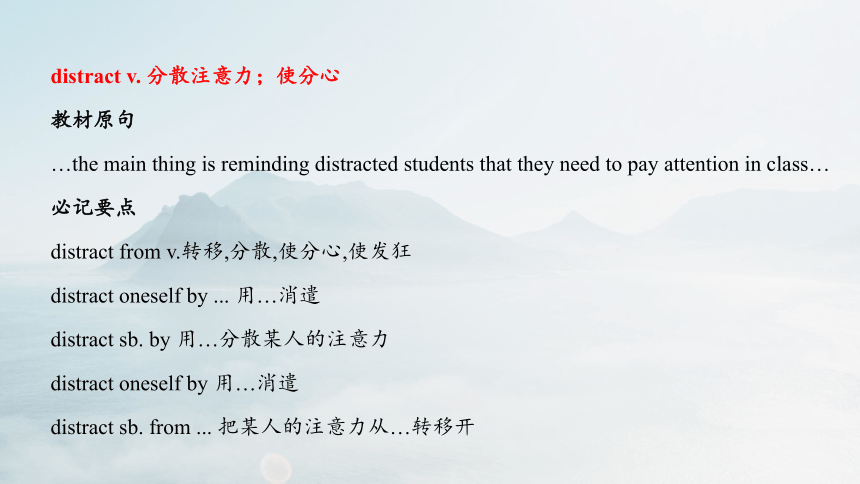

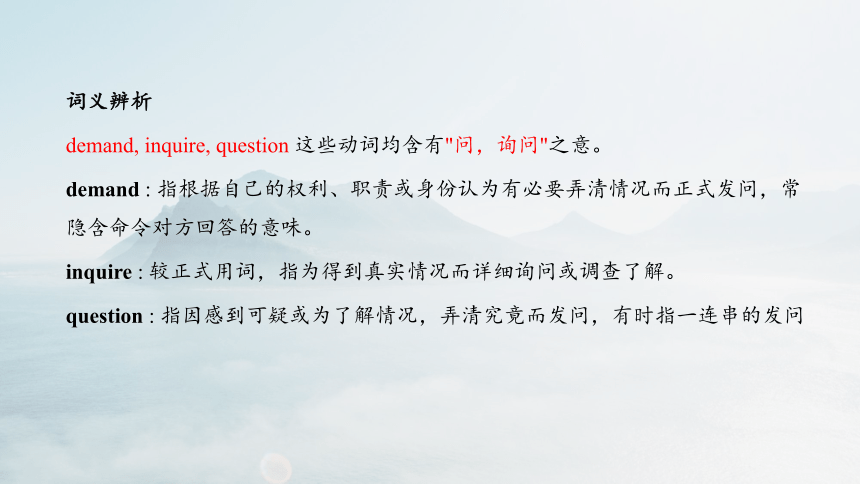
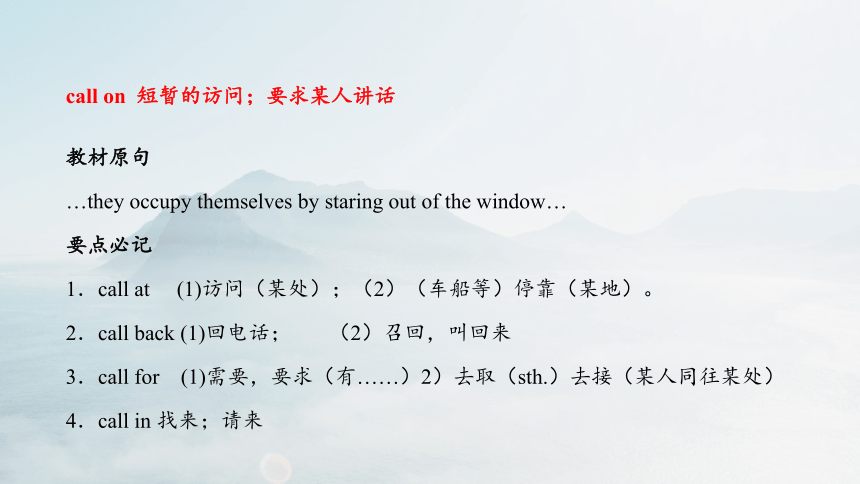
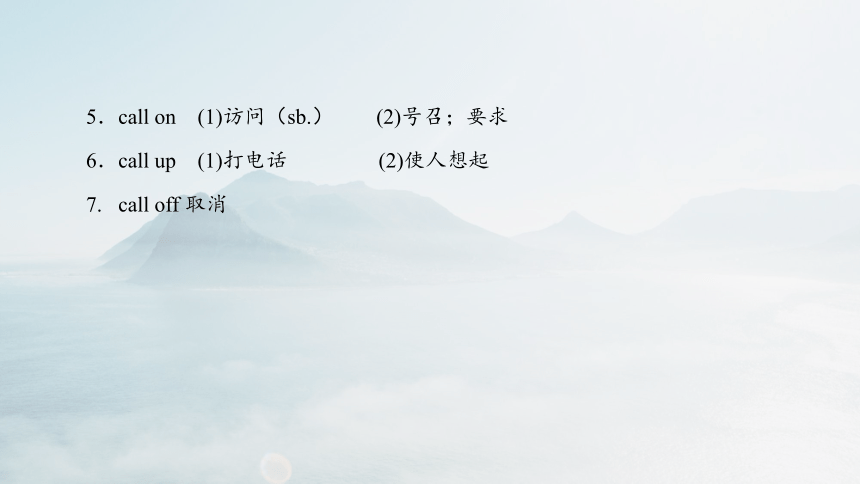
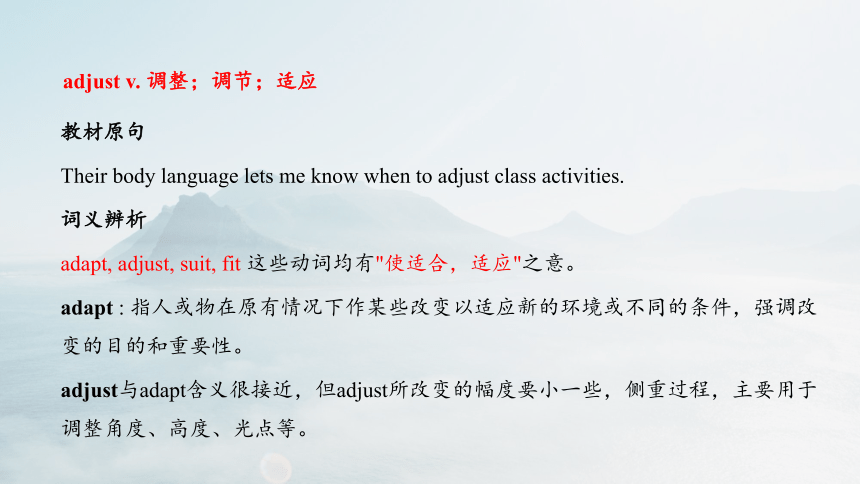

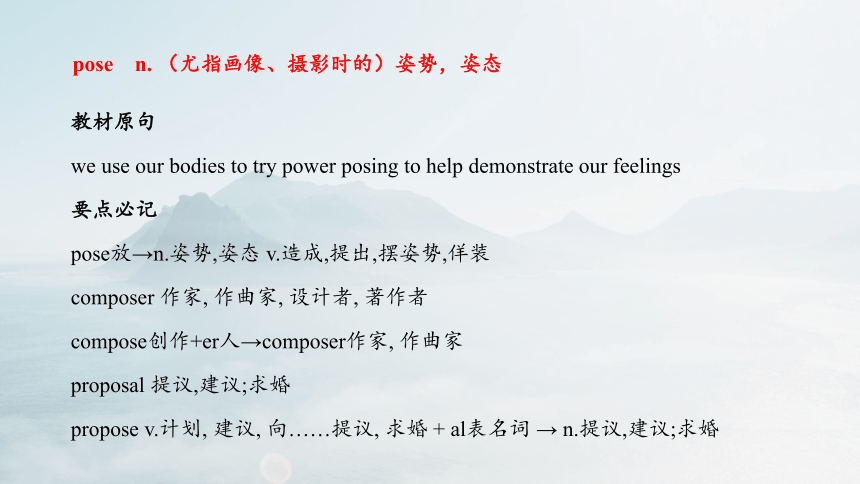
文档简介
(共45张PPT)
Unit 4 Body Language
Revision
1
Review all the new words and phrases.
Review the use of –ing form as object or predicative.
2
Goals
favour n. 帮助,恩惠,赞同,善行 vt. 喜爱,有利于,赞同,容貌像…
教材原句
…people favour shaking hands…
要点必记
n.
Would you please do me a favour, Ben 本,你能帮助我吗
May I ask a favour of you 请你帮帮忙好吗
The prevalent opinion is in favour of reform.一般舆论都支持改革。
核心词汇
v.
Of the two possible plans I favour the first.在这两种可行方案中我赞成前者。
I shall favour neither side in this election .此次选举中,我将不支持任何一方。
She always favours her youngest child.她总是偏爱她最小的孩子。
distract v. 分散注意力;使分心
教材原句
…the main thing is reminding distracted students that they need to pay attention in class…
必记要点
distract from v.转移,分散,使分心,使发狂
distract oneself by ... 用…消遣
distract sb. by 用…分散某人的注意力
distract oneself by 用…消遣
distract sb. from ... 把某人的注意力从…转移开
inquire v. 询问;打听
教材原句
I know I need to inquire and access what is going on…
要点必记
acquired 后天习得的 acquire获得;学到+ed……的→adj.后天习得的
require 需要;[of]要求,命令 re再+quir寻求,询问+e→再寻求→请求
enquire 询问 en进入……之中+quir寻求,询问+e→进入询问之中→询问
inquire 打听,询问;调查 in进入+quir寻求,询问+e→问进去→盘问
词义辨析
demand, inquire, question 这些动词均含有"问,询问"之意。
demand : 指根据自己的权利、职责或身份认为有必要弄清情况而正式发问,常隐含命令对方回答的意味。
inquire : 较正式用词,指为得到真实情况而详细询问或调查了解。
question : 指因感到可疑或为了解情况,弄清究竟而发问,有时指一连串的发问
call on 短暂的访问;要求某人讲话
教材原句
…they occupy themselves by staring out of the window…
要点必记
1.call at (1)访问(某处);(2)(车船等)停靠(某地)。
2.call back (1)回电话; (2)召回,叫回来
3.call for (1)需要,要求(有……)2)去取(sth.)去接(某人同往某处)
4.call in 找来;请来
5.call on (1)访问(sb.) (2)号召;要求
6.call up (1)打电话 (2)使人想起
7. call off 取消
adjust v. 调整;调节;适应
教材原句
Their body language lets me know when to adjust class activities.
词义辨析
adapt, adjust, suit, fit 这些动词均有"使适合,适应"之意。
adapt : 指人或物在原有情况下作某些改变以适应新的环境或不同的条件,强调改变的目的和重要性。
adjust与adapt含义很接近,但adjust所改变的幅度要小一些,侧重过程,主要用于调整角度、高度、光点等。
suit : 指适合要求,从而使人满意愉快。
fit : 含义广,指人或物适合或适应某一目的或用途。
pose n. (尤指画像、摄影时的)姿势,姿态
教材原句
we use our bodies to try power posing to help demonstrate our feelings
要点必记
pose放→n.姿势,姿态 v.造成,提出,摆姿势,佯装
composer 作家, 作曲家, 设计者, 著作者
compose创作+er人→composer作家, 作曲家
proposal 提议,建议;求婚
propose v.计划, 建议, 向……提议, 求婚 + al表名词 → n.提议,建议;求婚
assess vt. 评估;评价
教材原句
We make assessments and inferences from body language.
要点必记
adj. assessable 可估价的;可评价的;可征收的;可征税的
n. assessment 评定;估价
词义辨析
estimate, assess, evaluate, value 这些动词均有"估价,估计"之意。
estimate : 通常指由个人作出的主观估价。
assess : 原义指对为确定交多少税而估计,引申指通过估价以便更好利用。
evaluate:指使判断绝对准确,但多用于对人物的某方面的评价。
value : 侧重指一般人对某物的价值或价格所作的估计。
witness v. 目击;见证 n. 目击者
教材原句
…someone who witnesses another person employing the gesture…
例句展示
v.
I witnessed the traffic accident.
我目睹了那次交通事故。
The girl had no word for the sights she had witnessed.
这女孩无法形容她所目击的事。
n.
I was a witness to their quarrel.
我是他们吵架时的目击者。
The witness related what he had seen.
目击者讲述了他所见到的事情。
vary vi. (根据情况)变化;改变
教材原句
…body language varies from culture to culture…
要点必记
vary with 随…而变化
vary from 不同
vary in 在……方面变化;在……方面有差异
various adj. 各种各样的;不同的
variety n. 变化, 多样性, 种种, 品种, 种类
employ vt. 使用;应用;雇佣
教材原句
someone who witnesses another person employing the gesture
要点必记
employ sb. to do sth. 雇佣某人做…
employ …as… 雇佣…当…
employ oneself in (doing) sth. 从事…, 忙于…
employment n. 雇佣;就业
in employment 在业;有工作 out of employment 失业
employer n. 雇主;老板 employee n. 雇员
approve v. 赞成;同意
教材原句
eye contact is not always approved of
要点必记
approval n. 同意; 赞同
get one’s approval 得到某人的同意
give approval to 同意;批准
disapprove v. 不同意;不赞同
stare v. & n. 盯着看;凝视
教材原句
They occupy themselves by staring out of the window.
例句展示
1. She stared at him in surprise.
她惊讶地瞪着他看。
2. He stared at the word trying to remember what it meant.
他盯着这个单词,努力想记起它的意思。
词义辨析
gaze, glare, stare, peer, glance 这些动词都有"看,瞧"之意。
gaze : 指出于羡慕、感兴趣、关心或惊异而长时间目不转睛地看。
glare : 指用愤恨、凶狠或含敌意的眼光死死看着某人。
stare : 侧重因惊奇、好奇、粗鲁无礼等而睁大眼睛看。
peer : 指眯着眼睛仔细地或略为吃力地看。
glance : 指匆匆地或粗略地一看,侧重心不在焉地、匆忙地看一眼。
occupy vt. 占据;占用
教材原句
They occupy themselves by staring out of the window.
要点必记
occupy v.占领;使用 oc再次+cup抓+y→抓住地盘→占领
occupant 占有者
occupy[v.占领;使用]+ant……人→occupant占有者
occupation 职业;占有
occup=occupy[v.占领;使用]+ation表名词→occupation职业;占有
break down 消除;分解;打破
教材原句
…break down our feelings of shyness and powerlessness…
要点必记
break through突破;突围;有重要创见
break up打碎,破碎;结束;解散;衰落
break in/ into 破门而入
break out 爆发
break away from 挣脱;打破陈规
break the law/ rule 违背法律/规定
break one’s word/ promise 食言
How important is body language Complete the passage with the correct forms of the words in the box to find out.
crucial perceive lack component demonstrate interact stare at embarrassment
There are three _________ in any face to face communication. It is said that most of what we communicate with others is nonverbal. So when ___________with people, _________ the message conveyed by body language is _________ You cannot succeed in business and social encounters if you employ inappropriate body language. For example, _________ someone too long can be interpreted as a threat, standing too close may cause ____________ and uneasiness, and touching your neck when talking to others probably ____________ that you feel nervous and confidence. Sometimes body language speaks louder than words.
interacting
crucial
components
staring at
embarrassment
demonstrates
perceive
as 用法总结
1)用于表示同一个人的两种动作交替进行,指一边…一边…。 如:
The girl sings as she goes to school.
He looked behind occasionally as he went forward in the forest.
2)表示两个同步发生的动作或行为,意思是随着…的发展。如:
As time went on / by, she became more and more beautiful .
As children get older, they become more and more interested in everything.
核心句式:
3)As =Since 作"既然"、"由于"解,引导原因状语从句,常用来表示已为人们所知或显而易见的原因或理由。
如: As he’s been ill for ages, I will help him.
As / Since you're not feeling well, you may stay at home.
As he wasn't ready , we went without him.
4)as作关系代词,引导定语从句,表示正如这一点。
如: He is very careful, as we all know.
As is well-known, Taiwan belongs to China.
5)as作介词的用法。
1.表示好像。如:He dressed as a policeman.
2. 表示作为当作。如:I found a job as a guide.
状语从句中的省略
教材原句
It may demonstrate respect to look down when talking to an older person.
要点必记
用作状语的从句叫状语从句。
状语从句可置于句首、句末或句中,一般来说,状语从句都比较完整。但是,在一些状语从句中存在的省略问题,可以归纳为以下两点:
核心句式:
when, while, if, as if, although / though, as, until, once, whether, unless, where等引导的从句中,如果其谓语为be,而主语与主句的主语相同时,则从句的主语和be可省略。有时从句的主语为it时,也可省略it或从句中的有关成分。
e.g. If (it is) possible, this machine can be fixed at once.
可能的话,这台机器会立即修好。
than, as, no matter what /who等后面成分的省略。
e.g. We do not use more materials than (it is) necessary.
我们不用过多的材料。
动词-ing 做宾语和表语
一、做宾语
1.能跟这种宾语的常见动词有
Finish完成,enjoy喜欢,mind介意,practice,admit 承认, suggest 建议,allow 允许,appreciate 感激,avoid 避免,consider 考虑,delay 推迟,deny 否认,discuss 讨论,dislike 不喜欢,escape 逃脱,excuse 原谅……
e.g. Have you finished painting the windows 窗子漆好了没有
Would you mind shutting the door 劳驾把门关上好吗
核心句式:
2.有些短语动词和结构后面也要求跟动名词作宾语
insist on坚持, be worth值得, give up放弃,,put off推迟, keep on继续,
leave off 停止, can't help忍不住 , spend...in 花费, can’t stand 忍不住;
feel like 想;give up 放弃;put off 推迟…
3. 以下这些以to结尾的词组,可以直接接名词、代词,动词-ing
若不能接名词、代词作宾语,to+动词原形
pay attention to关注 object/objection to反对
look forward to期待 be/get used to习惯于
devote…to 奉献到…
e.g. We are looking forward to coming to China.我们期待着来中国。
4、在一些特别的句子结构中要求使用动名词:
have problems (+in) + 动名词, 做某事有困难
have difficulty in doing sth. 做某事有困难
have trouble/a hard time in doing sth. 做某事有困难
have fun (+in) + 动名词,做某事很开心
be busy (in) + 动名词; 忙于做
waste time (in) + 动名词;
e.g. The children are busy doing their homework. 孩子们忙于做作业。
when 和 while 区别
when,while都有“当……时候”的意思。
when既可表示某一点时间,也可以表示某一段时间 。
在when引导的时间状语从句中,其谓语动词可以是延续性的,也可以是非延续性的,可与主句中的谓语动词同时发生,也可在其后发生。
例如:
1、I was just reading a book when she came into my room.
她走进我房间时,我正在看书。
2、Were you writing when the teacher came in
老师进来的时候,你在写信吗?
核心句式:
while只能表示某一段时间,不能表示某一点时间。在while引导的时间状语从句中,其谓语动词只能是延续性的,而且也只能与主句中的谓语动词同时发生或存在。
例如:
1、While Jim was mending his bike, Lin Tao came to see him.
正当吉姆修自行车时,林涛来看他。
2、You can’t do your homework while you’re watching TV.
你不能一边看电视一边做家庭作业。
另外,when和while的区别还在于:while引导的时间状语从句多用进行时态,而when引导的时间状语从句多用一般时态。
例如:
1、While they were talking , the bell rang.
正在他们谈话的时候,上课铃响了。
2、I was doing my homework when my mother came back home yesterday evening
昨天晚上妈妈回家的时候,我正在做家庭作。
while 一词多用
教材原句
Most students favour the plan, while the teachers are not in favour of it.
要点必记
一、做名词,意思是“一会儿”“一段时间”。
She likes to lie down for a while after lunch.
她喜欢午饭后躺一会儿。
核心句式:
二、作连词,引导从句
(1)引导时间状语从句,例如
①We must strike while the iron is hot.趁热打铁。
②While she was listening to the radio,she fell asleep. 她听着收音机睡着了。
(2)引起让步状语从句,意思是“虽然…但是….”、“尽管…但是…”(多放于句首)
While he loves his students,he is very strict with them..
虽然他爱他的学生,可是他对他们很严格。
(3)引起条件状语,意思是“只要”
①While there is life ,there is hope.只要生命存在,就有希望。
②While there is will,there is a way.有志者事竟成。
三、作并列连词,意思为“而,然而”,表对比
1.Some people waste food while others haven't enough.
有些人很费粮食,然而有些人却吃不饱。
2.The son was having a good meal at home,while the parents were working in the fields.
儿子在家吃好饭而父母却在田里辛勤劳作。
Decide whether each verb in its -ing form functions as a subject (S), object (0), predicative (P), or attribute (A).
1. Seeing is believing A P
2. A man cannot be robbed of his learning O
3. Diving without an aim is like sailing without a compass. S O
4. After staying in the sleeping bag the whole night, I really needed to stretch my legs. O A
5. You should have been more careful. She started coughing and sneezing yesterday. O
6. One may agree that in a conversation, listening is as powerful as loving S P
7. After a long day she looked forward to putting her feet up with a nice cup of tea. O
8. Isabella really put her back into learning Chinese. She wants to start living in China in two or three months. O
9. Fishing in troubled waters may cause even more problems. S
1
Recite new words and phrases.
2
Write a passage to talk about the correct use of body language.
THANKS
Unit 4 Body Language
Revision
1
Review all the new words and phrases.
Review the use of –ing form as object or predicative.
2
Goals
favour n. 帮助,恩惠,赞同,善行 vt. 喜爱,有利于,赞同,容貌像…
教材原句
…people favour shaking hands…
要点必记
n.
Would you please do me a favour, Ben 本,你能帮助我吗
May I ask a favour of you 请你帮帮忙好吗
The prevalent opinion is in favour of reform.一般舆论都支持改革。
核心词汇
v.
Of the two possible plans I favour the first.在这两种可行方案中我赞成前者。
I shall favour neither side in this election .此次选举中,我将不支持任何一方。
She always favours her youngest child.她总是偏爱她最小的孩子。
distract v. 分散注意力;使分心
教材原句
…the main thing is reminding distracted students that they need to pay attention in class…
必记要点
distract from v.转移,分散,使分心,使发狂
distract oneself by ... 用…消遣
distract sb. by 用…分散某人的注意力
distract oneself by 用…消遣
distract sb. from ... 把某人的注意力从…转移开
inquire v. 询问;打听
教材原句
I know I need to inquire and access what is going on…
要点必记
acquired 后天习得的 acquire获得;学到+ed……的→adj.后天习得的
require 需要;[of]要求,命令 re再+quir寻求,询问+e→再寻求→请求
enquire 询问 en进入……之中+quir寻求,询问+e→进入询问之中→询问
inquire 打听,询问;调查 in进入+quir寻求,询问+e→问进去→盘问
词义辨析
demand, inquire, question 这些动词均含有"问,询问"之意。
demand : 指根据自己的权利、职责或身份认为有必要弄清情况而正式发问,常隐含命令对方回答的意味。
inquire : 较正式用词,指为得到真实情况而详细询问或调查了解。
question : 指因感到可疑或为了解情况,弄清究竟而发问,有时指一连串的发问
call on 短暂的访问;要求某人讲话
教材原句
…they occupy themselves by staring out of the window…
要点必记
1.call at (1)访问(某处);(2)(车船等)停靠(某地)。
2.call back (1)回电话; (2)召回,叫回来
3.call for (1)需要,要求(有……)2)去取(sth.)去接(某人同往某处)
4.call in 找来;请来
5.call on (1)访问(sb.) (2)号召;要求
6.call up (1)打电话 (2)使人想起
7. call off 取消
adjust v. 调整;调节;适应
教材原句
Their body language lets me know when to adjust class activities.
词义辨析
adapt, adjust, suit, fit 这些动词均有"使适合,适应"之意。
adapt : 指人或物在原有情况下作某些改变以适应新的环境或不同的条件,强调改变的目的和重要性。
adjust与adapt含义很接近,但adjust所改变的幅度要小一些,侧重过程,主要用于调整角度、高度、光点等。
suit : 指适合要求,从而使人满意愉快。
fit : 含义广,指人或物适合或适应某一目的或用途。
pose n. (尤指画像、摄影时的)姿势,姿态
教材原句
we use our bodies to try power posing to help demonstrate our feelings
要点必记
pose放→n.姿势,姿态 v.造成,提出,摆姿势,佯装
composer 作家, 作曲家, 设计者, 著作者
compose创作+er人→composer作家, 作曲家
proposal 提议,建议;求婚
propose v.计划, 建议, 向……提议, 求婚 + al表名词 → n.提议,建议;求婚
assess vt. 评估;评价
教材原句
We make assessments and inferences from body language.
要点必记
adj. assessable 可估价的;可评价的;可征收的;可征税的
n. assessment 评定;估价
词义辨析
estimate, assess, evaluate, value 这些动词均有"估价,估计"之意。
estimate : 通常指由个人作出的主观估价。
assess : 原义指对为确定交多少税而估计,引申指通过估价以便更好利用。
evaluate:指使判断绝对准确,但多用于对人物的某方面的评价。
value : 侧重指一般人对某物的价值或价格所作的估计。
witness v. 目击;见证 n. 目击者
教材原句
…someone who witnesses another person employing the gesture…
例句展示
v.
I witnessed the traffic accident.
我目睹了那次交通事故。
The girl had no word for the sights she had witnessed.
这女孩无法形容她所目击的事。
n.
I was a witness to their quarrel.
我是他们吵架时的目击者。
The witness related what he had seen.
目击者讲述了他所见到的事情。
vary vi. (根据情况)变化;改变
教材原句
…body language varies from culture to culture…
要点必记
vary with 随…而变化
vary from 不同
vary in 在……方面变化;在……方面有差异
various adj. 各种各样的;不同的
variety n. 变化, 多样性, 种种, 品种, 种类
employ vt. 使用;应用;雇佣
教材原句
someone who witnesses another person employing the gesture
要点必记
employ sb. to do sth. 雇佣某人做…
employ …as… 雇佣…当…
employ oneself in (doing) sth. 从事…, 忙于…
employment n. 雇佣;就业
in employment 在业;有工作 out of employment 失业
employer n. 雇主;老板 employee n. 雇员
approve v. 赞成;同意
教材原句
eye contact is not always approved of
要点必记
approval n. 同意; 赞同
get one’s approval 得到某人的同意
give approval to 同意;批准
disapprove v. 不同意;不赞同
stare v. & n. 盯着看;凝视
教材原句
They occupy themselves by staring out of the window.
例句展示
1. She stared at him in surprise.
她惊讶地瞪着他看。
2. He stared at the word trying to remember what it meant.
他盯着这个单词,努力想记起它的意思。
词义辨析
gaze, glare, stare, peer, glance 这些动词都有"看,瞧"之意。
gaze : 指出于羡慕、感兴趣、关心或惊异而长时间目不转睛地看。
glare : 指用愤恨、凶狠或含敌意的眼光死死看着某人。
stare : 侧重因惊奇、好奇、粗鲁无礼等而睁大眼睛看。
peer : 指眯着眼睛仔细地或略为吃力地看。
glance : 指匆匆地或粗略地一看,侧重心不在焉地、匆忙地看一眼。
occupy vt. 占据;占用
教材原句
They occupy themselves by staring out of the window.
要点必记
occupy v.占领;使用 oc再次+cup抓+y→抓住地盘→占领
occupant 占有者
occupy[v.占领;使用]+ant……人→occupant占有者
occupation 职业;占有
occup=occupy[v.占领;使用]+ation表名词→occupation职业;占有
break down 消除;分解;打破
教材原句
…break down our feelings of shyness and powerlessness…
要点必记
break through突破;突围;有重要创见
break up打碎,破碎;结束;解散;衰落
break in/ into 破门而入
break out 爆发
break away from 挣脱;打破陈规
break the law/ rule 违背法律/规定
break one’s word/ promise 食言
How important is body language Complete the passage with the correct forms of the words in the box to find out.
crucial perceive lack component demonstrate interact stare at embarrassment
There are three _________ in any face to face communication. It is said that most of what we communicate with others is nonverbal. So when ___________with people, _________ the message conveyed by body language is _________ You cannot succeed in business and social encounters if you employ inappropriate body language. For example, _________ someone too long can be interpreted as a threat, standing too close may cause ____________ and uneasiness, and touching your neck when talking to others probably ____________ that you feel nervous and confidence. Sometimes body language speaks louder than words.
interacting
crucial
components
staring at
embarrassment
demonstrates
perceive
as 用法总结
1)用于表示同一个人的两种动作交替进行,指一边…一边…。 如:
The girl sings as she goes to school.
He looked behind occasionally as he went forward in the forest.
2)表示两个同步发生的动作或行为,意思是随着…的发展。如:
As time went on / by, she became more and more beautiful .
As children get older, they become more and more interested in everything.
核心句式:
3)As =Since 作"既然"、"由于"解,引导原因状语从句,常用来表示已为人们所知或显而易见的原因或理由。
如: As he’s been ill for ages, I will help him.
As / Since you're not feeling well, you may stay at home.
As he wasn't ready , we went without him.
4)as作关系代词,引导定语从句,表示正如这一点。
如: He is very careful, as we all know.
As is well-known, Taiwan belongs to China.
5)as作介词的用法。
1.表示好像。如:He dressed as a policeman.
2. 表示作为当作。如:I found a job as a guide.
状语从句中的省略
教材原句
It may demonstrate respect to look down when talking to an older person.
要点必记
用作状语的从句叫状语从句。
状语从句可置于句首、句末或句中,一般来说,状语从句都比较完整。但是,在一些状语从句中存在的省略问题,可以归纳为以下两点:
核心句式:
when, while, if, as if, although / though, as, until, once, whether, unless, where等引导的从句中,如果其谓语为be,而主语与主句的主语相同时,则从句的主语和be可省略。有时从句的主语为it时,也可省略it或从句中的有关成分。
e.g. If (it is) possible, this machine can be fixed at once.
可能的话,这台机器会立即修好。
than, as, no matter what /who等后面成分的省略。
e.g. We do not use more materials than (it is) necessary.
我们不用过多的材料。
动词-ing 做宾语和表语
一、做宾语
1.能跟这种宾语的常见动词有
Finish完成,enjoy喜欢,mind介意,practice,admit 承认, suggest 建议,allow 允许,appreciate 感激,avoid 避免,consider 考虑,delay 推迟,deny 否认,discuss 讨论,dislike 不喜欢,escape 逃脱,excuse 原谅……
e.g. Have you finished painting the windows 窗子漆好了没有
Would you mind shutting the door 劳驾把门关上好吗
核心句式:
2.有些短语动词和结构后面也要求跟动名词作宾语
insist on坚持, be worth值得, give up放弃,,put off推迟, keep on继续,
leave off 停止, can't help忍不住 , spend...in 花费, can’t stand 忍不住;
feel like 想;give up 放弃;put off 推迟…
3. 以下这些以to结尾的词组,可以直接接名词、代词,动词-ing
若不能接名词、代词作宾语,to+动词原形
pay attention to关注 object/objection to反对
look forward to期待 be/get used to习惯于
devote…to 奉献到…
e.g. We are looking forward to coming to China.我们期待着来中国。
4、在一些特别的句子结构中要求使用动名词:
have problems (+in) + 动名词, 做某事有困难
have difficulty in doing sth. 做某事有困难
have trouble/a hard time in doing sth. 做某事有困难
have fun (+in) + 动名词,做某事很开心
be busy (in) + 动名词; 忙于做
waste time (in) + 动名词;
e.g. The children are busy doing their homework. 孩子们忙于做作业。
when 和 while 区别
when,while都有“当……时候”的意思。
when既可表示某一点时间,也可以表示某一段时间 。
在when引导的时间状语从句中,其谓语动词可以是延续性的,也可以是非延续性的,可与主句中的谓语动词同时发生,也可在其后发生。
例如:
1、I was just reading a book when she came into my room.
她走进我房间时,我正在看书。
2、Were you writing when the teacher came in
老师进来的时候,你在写信吗?
核心句式:
while只能表示某一段时间,不能表示某一点时间。在while引导的时间状语从句中,其谓语动词只能是延续性的,而且也只能与主句中的谓语动词同时发生或存在。
例如:
1、While Jim was mending his bike, Lin Tao came to see him.
正当吉姆修自行车时,林涛来看他。
2、You can’t do your homework while you’re watching TV.
你不能一边看电视一边做家庭作业。
另外,when和while的区别还在于:while引导的时间状语从句多用进行时态,而when引导的时间状语从句多用一般时态。
例如:
1、While they were talking , the bell rang.
正在他们谈话的时候,上课铃响了。
2、I was doing my homework when my mother came back home yesterday evening
昨天晚上妈妈回家的时候,我正在做家庭作。
while 一词多用
教材原句
Most students favour the plan, while the teachers are not in favour of it.
要点必记
一、做名词,意思是“一会儿”“一段时间”。
She likes to lie down for a while after lunch.
她喜欢午饭后躺一会儿。
核心句式:
二、作连词,引导从句
(1)引导时间状语从句,例如
①We must strike while the iron is hot.趁热打铁。
②While she was listening to the radio,she fell asleep. 她听着收音机睡着了。
(2)引起让步状语从句,意思是“虽然…但是….”、“尽管…但是…”(多放于句首)
While he loves his students,he is very strict with them..
虽然他爱他的学生,可是他对他们很严格。
(3)引起条件状语,意思是“只要”
①While there is life ,there is hope.只要生命存在,就有希望。
②While there is will,there is a way.有志者事竟成。
三、作并列连词,意思为“而,然而”,表对比
1.Some people waste food while others haven't enough.
有些人很费粮食,然而有些人却吃不饱。
2.The son was having a good meal at home,while the parents were working in the fields.
儿子在家吃好饭而父母却在田里辛勤劳作。
Decide whether each verb in its -ing form functions as a subject (S), object (0), predicative (P), or attribute (A).
1. Seeing is believing A P
2. A man cannot be robbed of his learning O
3. Diving without an aim is like sailing without a compass. S O
4. After staying in the sleeping bag the whole night, I really needed to stretch my legs. O A
5. You should have been more careful. She started coughing and sneezing yesterday. O
6. One may agree that in a conversation, listening is as powerful as loving S P
7. After a long day she looked forward to putting her feet up with a nice cup of tea. O
8. Isabella really put her back into learning Chinese. She wants to start living in China in two or three months. O
9. Fishing in troubled waters may cause even more problems. S
1
Recite new words and phrases.
2
Write a passage to talk about the correct use of body language.
THANKS
